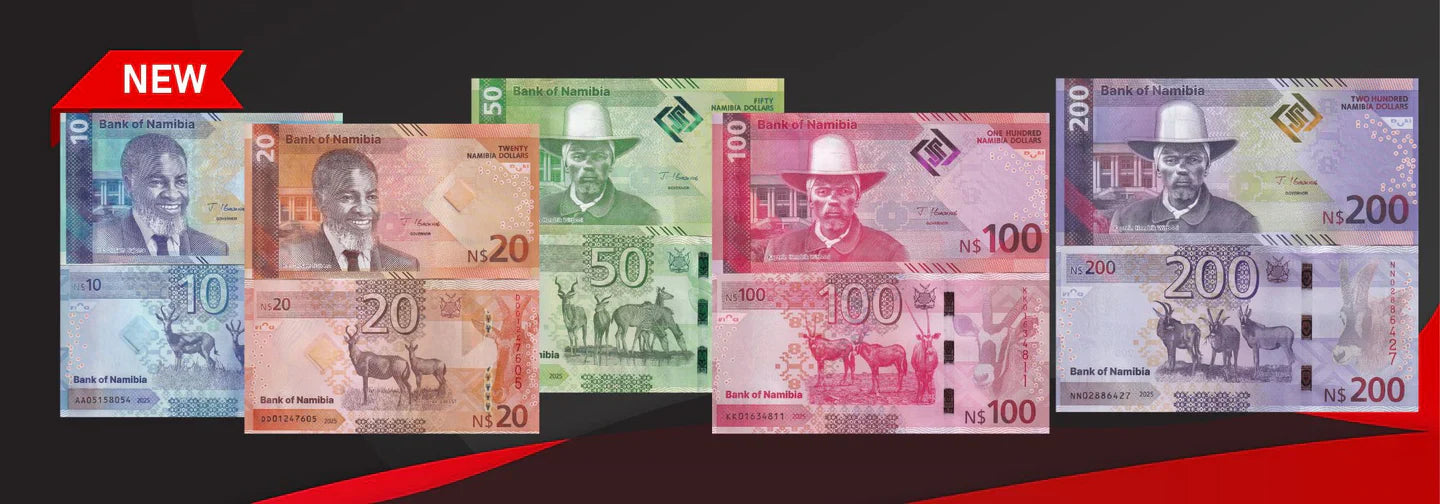2025 marks a bold and transformative chapter in Namibia’s monetary history. After years of planning, design, and public consultation, the Bank of Namibia rolled out an upgraded series of banknotes—and a fully redesigned coinage system—to better reflect the country’s identity, strengthen security, and align with modern standards. In this article, I’ll walk you through the journey from concept to circulation, highlight key changes, and explore what it all means—for you, for Namibia’s economy, and for the future of money.

Historical Background of Namibian Banknotes
Early Issues and Evolution
From its independence onward, Namibia has issued banknotes reflecting its unique heritage, fauna, and leadership. Over time, designs, security features, and materials evolved to keep pace with counterfeiting risks, wear and tear, and public expectations.
The 2012 Series and Its Features
A milestone occurred in 2012 when Namibia launched a refreshed banknote series. This series featured robust security features, familiar imagery, and upgraded durability. That design remained the backbone of daily transactions for over a decade.
Special and Commemorative Issues
In early 2025, Namibia introduced a commemorative N$60 banknote to honor the late President Hage Geingob. This showed that even as the regular series awaited its full upgrade, Namibia continued to use banknotes as tools of national commemoration and identity.

The 2025 Upgrade — Announcement & Launch
Official Unveiling & Government Statements
On 24 July 2025, the Bank of Namibia officially launched its upgraded banknote series, alongside a completely redesigned coin series. The event was not just a financial update—it was a symbolic recommitment to national pride, transparency, and financial sovereignty.
Timeline: From Design to Circulation
Following the unveiling mid-2025, the new banknotes and coins entered circulation at commercial banks and ATMs countrywide by late September 2025. The Bank of Namibia made sure the rollout would be smooth, allowing both old and new currency to coexist temporarily.

What’s New? Key Changes in the 2025 Series
Denominations & Materials
Hybrid (“composite”) substrate for N$10 & N$20
The N$10 and N$20 notes in the new series are printed on a composite (hybrid) substrate that blends polymer-like durability with the tactile familiarity of paper.
Paper-based notes for N$50, N$100, N$200
Meanwhile, the higher denominations—N$50, N$100, N$200—remain paper-based. Since they’re exchanged less often, they don’t require the extra durability of composite materials.
Security Features Enhancements
Color-shifting inks & holographic threads
These new notes include modern anti-counterfeiting tools like color-shifting inks, holographic threads, and advanced security threads.
Transparent windows, embossing, UV features
Some denominations feature transparent “windows,” embossing, and specialized UV-print technologies to guard against forgery and help machines detect authenticity.
Tactile Features for the Visually Impaired
All notes in the series include raised or slanted tactile lines to aid blind and visually impaired users—something not always present in older banknotes.
Design Updates: Portraits, Wildlife & Symbolism
The front of each note retains the familiar portraits of President Sam Nujoma and Kaptein Hendrik Witbooi, tying continuity to change. On the reverse, the iconic wildlife of Namibia continues to appear, now more integrated with the security elements and design patterns.
Coins Redesigned in Tandem
Why Coins Also Changed in 2025
In a holistic upgrade, the Bank of Namibia didn’t stop at banknotes. From materials to design motifs, the coin series was overhauled to match the same goals: durability, symbolism, and efficiency.
New Coin Denominations, Motifs & Specifications
The new coins are smaller, lighter, and better suited for frequent handling. Each coin features imagery tied to Namibia’s economy—such as agriculture, mining, tourism, and renewable energy. The coins reflect diverse sectors: for example, the 5-dollar coin celebrates mining, the 1-dollar coin retail, etc.
Legal Tender Status & Transition
Old Notes & Coins Remain Legal Tender
Importantly, the Bank of Namibia confirmed that existing banknotes and coins will remain legal tender and circulate alongside the upgraded series during a transitional period.
Parallel Circulation and Phase-Out Plan
This parallel circulation allows businesses, banks, and the public to adapt gradually. Over time, older series may be withdrawn—but no sudden disruption is expected.

Public Awareness & “Look, Feel, Tilt” Campaign
Educational Drive by the Bank of Namibia
To avoid confusion or fraud, authorities launched a public education campaign instructing people to “look, feel, and tilt” the banknotes to verify authenticity. The campaign includes sample notes, videos, and announcements.
Tips for Recognizing Authenticity
-
Look for clear embedded security windows, fine-line patterns, and consistent designs
-
Feel for raised prints or tactile lines
-
Tilt to see effects like color shifts or holographic threads

Impacts & Benefits of the New Series
Combating Counterfeiting & Enhancing Trust
With more robust security features, the 2025 series helps deter forgery and strengthens public confidence in the currency.
Durability & Cost Savings
Using composite or more robust materials for frequently handled notes prolongs their life, reducing replacement costs over time.
Inclusivity & Accessibility
Tactile features demonstrate an inclusive approach, ensuring that visually impaired citizens can more confidently use cash.
Challenges & Public Reception
Adjustments in Business & Cash Handling
Businesses will need to recalibrate machines (ATMs, vending, counting machines) to accept the new notes. Training and software updates may be required.
Public Feedback, Rumors, Misconceptions
As with any currency change, rumors or skepticism may arise (e.g., “Is the new note fake?”). Clear public communication helps counter misinformation.
Comparisons with Currency Upgrades in Other Countries
Hybrid / Polymer Trend in Global Currencies
Many nations are shifting toward polymer or hybrid substrates for their low-value notes (e.g. Australia, Canada, UK). Namibia’s hybrid approach aligns with this modern direction.
Lessons from Recent Banknote Upgrades
Countries that rushed transitions often face higher costs, confusion, or counterfeiting risks. Namibia’s cautious, phased rollout is a wiser path.\

What to Expect in the Coming Years
Gradual Withdrawal of Older Series
Over time, central banks will likely begin withdrawing older notes, especially those most prone to wear or forgery.
Potential Digital / CBDC Discussions
Given global trends, Namibia may explore a central bank digital currency (CBDC) in the future. The 2025 series may act as a bridging phase.
Further Security Innovations
Expect ongoing research in nanomaterials, advanced inks, and machine-readable features to keep ahead of counterfeiters.
Conclusion
The Namibia Banknote 2025 upgrade is more than just a redesign—it represents an intentional step toward a resilient, inclusive, and secure monetary future. By combining durability, advanced security features, tactile aids, and symbolic national imagery, the Bank of Namibia is equipping its currency to face modern challenges. The parallel circulation and education campaigns aim to reduce disruption. For everyday Namibians, the changes should feel familiar, yet safer and more trustworthy. In the years ahead, this transition may pave the way for digital currency innovation and further modernization of Namibia’s financial ecosystem.
FAQs
Q1: When did the new banknotes and coins enter circulation?
A1: They began rolling out in late September 2025 across banks and ATMs.
Q2: Are the old banknotes still valid?
A2: Yes, the older series remain legal tender for now and circulate alongside the new notes.
Q3: How do I verify a new banknote’s authenticity?
A3: Use the “look, feel, tilt” method—check for clear security windows, raised patterns, color shifts, and tactile lines.
Q4: Why only N$10 and N$20 use composite substrate?
A4: Because they’re handled most often, so the extra durability of a composite/hybrid material is beneficial. The higher denominations remain on paper.
Q5: Will Namibia adopt a digital currency (CBDC) soon?
A5: No official announcement yet, but many central banks are exploring it. The 2025 upgrade may serve as a step toward future digital options.

